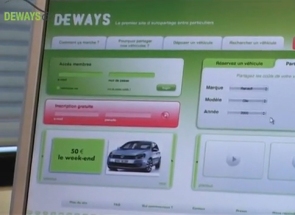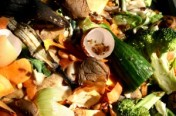Filed under: Best Practices in France | Tags: France, Ministery of Ecology, Nathalie Kosciusko-Morizet, Pacte Ecologique, Sarkozy
Sarkozy has presented his new team of ministers for his third presidency season. As not unusual in France, ministeries, responsibilities and ministers have been reshuffled. Nathalie Kosciusko-Morizet, a former secretary of state for Ecology has been appointed as Minister of Ecology.


Nathalie Kosciusko-Morizet and ‘Passage de Pouvior’ of Borloo to Kosciusko-Morizet
Jean-Francois Borloo has been dismissed with the appointment of Nathalie Kosciusko-Morizet. French associations and NGO’s welcome Nathalie Kosciusko-Monet (or ‘NKM’) for her competences and drive. She has extensive experience in public services, among others as (adjoint) major of Paris suburb cities and secretary of state of Ecology (2007-2009).
Smaller scope. The main concern of French NGO’s and associations is related to the fact that the importance and scope of the ministery (once nr 2 now nr 4 in the government) has been strongly decreased. This raises the fear that the ambitious Grenelle Environnement Plans, stimulating sustainable development in all industry sectors, will not have significant momentum against other forces, such as the nucleair industry..
Once a Super Ministery… In 2007, the Super Ministery Ecologie, Environment, Climate Discussions, Sea, Green Technologies and Energie was created by Sarkozy and lead by Jean-Francois Borloo as the most important ministery in France, in response to Nicolas Hulot ‘Pacte Ecologie’, signed by 750.000 people in France.
Now just Ecologie.. Mrs Kosciusko-Morizet will inheret now in 2010, a Ministery that has been decreased. She will ‘only’ supervise Ecologie, Sustainable Development, Transport and Housing. She will be notably busy with the implementation of the 257 new articles of the new Grenelle Environnement 2.
Energie moves to Economie. Remarkable is the choice of moving ‘Energie’ to the ministery of Economie lead by Christine Lagarde. People fear that it will be difficult for France to keep its commitments for a maximum of green house gas emissions and its development of renewable energies. It does not help that new ministers like Patrick Ollier (relations avec parliament) are rather right-wing, pro-nucleair and not in favourite of wind energy.
Sceptical NGO’s. Pascal Husting, Director Greenpeace France, repeats his comments following the Grenelle de l’Environnement presentations : he believes that Sarkozy and Fillon have not kept their promises and engagements with respect to the environment. He fears that government Sarkozy/Fillon 3 (3rd season) will be even worse.. Arnaud Gossement of ‘Les Amis de la Terre’ points out that the Superministery has been beheaded and that it will be much more difficult to take governmental decisions in favour of ecologie now the related topics are spread.
Worry. French people in favour of Sustainable Development are rather worried that the ambitious plans of the Grenelle de l’Environnement will slow down, or worse, reverse, avec this new governmental elan. Time for a new Pacte Ecologique ?
Implementation of Grenelle de l’Environnement. ‘Sur et certain’, Mrs Kosciusko-Morizet will need all support, inside the government, from industry and associations to implement the Grenelle de l’Environnement !
Sources :
http://www.developpement-durable.gouv.fr/
http://www.actu-environnement.com/ae/newsletter/newsletter_quotidienne.php4?id=231#xtor=ES-6
Filed under: Sustainability in France | Tags: Eco-Labels, France, Government, Life Cycle Analyses, Poverty, Renewable Energy, Sustainable Development
Jean-Francois Borloo has unveiled his new plan for boosting sustainable development in France. New goals are set to encourage green economy as well as backing the creation of an World Organisation for global governance on environmental issues.
By launching its new plan ‘La Strategie National du Développement Durable 2010-2013′ government Sarkozy wants to boost the national green economy and fair trade. The new plan is in line with the bills ‘Grenelle d’Environnement I and II‘ that have been presented previously in 2007 and 2010 (1,2).
First of all, the French government wants to make sustainable products more accessible and to more people. As one of the indicators for this, the sales of eco-labelled products should be doubled by 2012.
Secondly, the French government wants to encourage companies to ncrease their recycling practices, use renewable energy and develop responsible products by taking into consideration the complete life cycle of products : from design, production, distribution until disposal or recycling.
Among the goals (see all here) are :
- Reduction of Frances greenhouse gas emissions by 20% in 2020 compared to 1990 (similar to EU objectives)
- Increasing the part of French national energy consumption to 23% from renewable energy by 2020. Despite extensive oppositions from (fishing) communities in France a RFP will be launched for 600 offshore windmills representing 3000 MW and 10 to 15 billion euros (3)
- Realisation of at least 1000 ‘Agenda 21’ implementations within local communities,
- And a reduction of national poverty by 30% up till 2012.
Special dashboards have been developed to track the progress of a variety of indicators : R&D investments, working women participation within governmental institutions, green house gas emissions, renewable energies, energie consumption transport, life expectancy, pauvrity, working seniors, jobless youngsters, public donations and general social-economical factors like under and unemployment, income spread, demography and fertility rates.
Sarkozy is also supporting the development of a new World Environment Organisation. This new organisation should guarantee environmental governance on a global level. The next Rio de Janeiro Earth Summit 2012 is ought to be the good momentum (4).
If you want to read more about French sustainability developments I invite you to read my previous blogs on : Pacte Ecologique of Nicolas Hulot that urged for stronger governmental intervention ; Grenelle d’Environnement I focussing on Building Sector and Transport ; Why Eco-labels are developed to help consumers make a balanced choice, CSR reporting rules extended to large SMEs ; Grenelle 2 focussing on local application ; How to turn around media ‘saturation’ and Why targeted examples of individual benefits of responsible products and behaviour are needed.
Sources : 1. http://www.developpement-durable.gouv.fr/IMG/pdf/RepIDDc.pdf ; 2. http://www.environnement-magazine.fr/presse/environnement/actualites/1910/developpement-durable/adoption-de-la-nouvelle-strategie-nationale-de-developpement-durable; 3. http://www.developpementdurable.com/economie/2010/08/A5356/la-france-courtise-enfin-leolien-offshore.html; 4. http://www.euractiv.com/en/sustainability/frances-new-green-bill-inspired-eu-texts-news-493692 ;
Filed under: Laws and Public Interventions | Tags: Fondation Nicolas Hulot, France, Grenelle d'Environnement, Grenelle II, NGOs, WWF
Today, the new ‘Grenelle II’ laws are presented in the French Parliament. Though the ‘Tax Carbone’ has been abandoned (France will wait EU regulations). detailed plans are presented for building, transport and energy sector. Local authorities are asked to play a more important and facilitating role. French NGO’s point out the weakened ambitions since the Grenelle II and ask French parliament members to push the government to keep its promises (1, 2, 3, 4).

The Grenelle II follows the Grenelle I (2007) and a second public consultation round with representatives of large companies (MEDEF), SMEs (CGPME), NGOs.
The new law package contains six pillars and contains the ‘outlines’ and ‘logistics’ of the application on regional and local level.
1. Improving the Energetic Performance of Buildings. Among the measures are : insisting on ‘Batiments a Basse Consommation’ (BBC, < 50 KW/H/m2 per year) for new buildings and to reduce the consumption of existing buildings by 38% untill 2020. Which makes sense as the existing buildings use on average 250 KW/H/m2 per year, as stipulated in earlier article.
2. Creating a change in Transport Use. Among the measures presented are : speeding up the process of public transport infrastructure, insisting local public authorities on offering ‘lease-bikes’ and car-sharing programs, and subvention of electric and hybrid car development.
3. Reducing significantly Energy Consumption and Carbon Emissions. Measurements foreseen are : Obligation of all entreprises with over 500 employes and municipalities with more than 500.000 inhabitants to calculate CO2 emissions on a yearly bases, see also earlier article, Stimulation of Renewable Energies, notably by simplification of governmental procedures.
4. Preserving Biodiversity. Pharmaceutical and hospital products will be more restricted and reported. Choice of new geographical zones that need special attention.
5. Risks, health and waste. Various measurements are proposed, such as the Protection of Electrical and Telephone Network workers. Quite remarkable is the new and explicit Interdiction of telephone use in all schools of all ages. The phones may only be used outside the school, nly with seperate earphones connected with a wire to the phone.
6. A new Ecological Governance Model. Introduction of Five ‘Colleges’ of Stakeholders : ONG, Entreprises, Unions, Public Authorities and Public Administration. Regions with over 50 000 inhabitants will be obliged to create a Sustainable Development report. Exchange with NGOs, Associations and Entreprise Representatives will be extended on a regional and local level to reinforce transparance and exemplarity. Each product should carry CO2 emission information, related to the CO2 emissions created by transport of people and goods.
Open Letter of French NGO’s to vote against the new laws. A group of French NGOs have sent an open letter to the French public representatives to express their inconvenience with the current proposed laws that are regarded as ‘weakened’. They point out that the French Government tends to forget the earlier made promises in 2007 of the Grenelle I claiming to promote renewable energies, whilst subventionning notably nuclear (not solar nor wind energy) in the 2009 Grand Emprunt Plans. They ask the delegates to carefully study the new laws, ask clarifications, clearer and obligatory transparancy on social impacts of French companies and clear dates as of which new laws should be operational (such as the Eco-Etiquettage) (4). 
Sources and more information on : 1. http://www.euractiv.com/en/sustainability/France-seeks-to-establish-local-%27eco-governance%27-news-488893?utm_source=EurActiv+Newsletter&utm_campaign=57f6e90466-my_google_analytics_key&utm_medium=email; 2. http://www.developpement-durable.gouv.fr/Projet-de-loi-Grenelle-2-le-temps, 3. http://www.developpement-durable.gouv.fr/IMG/pdf/repere_focus.pdf; 4. http://www.fondation-nicolas-hulot.org/sites/default/files/pdf/publications/lettre_ouverte_deputes_grenelle2_28av2010.pdf
Filed under: ONG | Tags: Fondaterra, France, Green TIC Campus, SFR, Student Contest
Fondaterra – French NGO for Sustainable Territories – and French Telecom Operator SFR have launched a Student Contest for Innovative new ICT concepts. Students were asked to come up with solutions that contribute to a more Sustainable Campus. Among the concepts presented were those that attack the energy and food waste in and around universities, as well as encourage public transport and sharing privately owned cars.
The Green ICT Campus Challenge of SFR & Fondaterra
Eight nominated teams from business and technological universities presented their new ICT solutions. Despite the fact that the ICT concepts were not always revolutionairy from a technological viewpoint, using mostly existing technology such as Internet, Social Networks, smartphones and RFID, the jury was happy to welcome the new applications and new domains and the positive effects this would bring to the environmental and solidary spirit on the campus.
Representatives of French industry, NGOs, journalist, public sector and scientists took part of the jury: Herve le Treut (Professor Mechanical Engineering at CNRS), Dorothée Briaumont of Comité 21 (which is the French national program of public sustainable development) Anne Dubosc, (MEEDM), Yolaine de la Bigne (Journalist & Founder of Neoplanete Magazine), Sylvie Faucheux (Head of French University Presidents), Fabrice Haiat (President of Vizelia) Marie Françoise Guyonnaud (Director Fondaterra) and Catherine Moulin (Director Health and Environment at SFR).
The ‘Ligne Verte’ concept was the winner of ‘Prospective Concepts’. Architecture and City Development students Florian Launay and Ilann Raugé study at the Ecole Nationale Superieure d’Architecture de Bretagne in Rennes. They want to associate the ‘recycling act’ with ‘public transport’ to reinforce sustainable behaviour : by placing waste baskets at metro, bus and train stations that measure the waste that is properly selected (plastic, paper, metal), students gain ‘waste credits’ which can be transfered into public transport tickets. An interesting thought : create value with waste ..

Visual of Ligne Verte Concept, copyrights at Ilann Rougé and Florian Launay, students of ENSA Bretagne
The ‘Eco-Sapiens’ won one of the two 1st prices in the category ‘Operational Concepts’. Frank Ducceschi, student Economical Analyses and Risk Management at of the Université de Versailles Saint-Quention explains how 50% energy reduction can be gained when university rooms are more carefully heated. University rooms are only used 62% of the time on average. By using RFID and laser to identify peoples presence, and the warmth creation by human bodies, over 50% energy consomption can be reduced. To the university of Versailles this can mean a reduction of 1,4 M euro per annum or 1920 T CO2, equivalent to the energy consomption of 300 French households.
The other first prize winner was the ‘Green Cantines ‘ concept of students from the Ecole Superieure de Gestion Sidi Sakho, Christine Du, Mehdi Terbeche and Guillaume Ralue. The objective of the students is to reduce the enormous amount of food thrown away by the university cantines. [Note that French students are used to enjoy a warm and proper 3-course lunch]. By using the current logistic ICT platform and ‘on demand’ information to be created by students, the student estimate to reduce over 50% of the current food waste. Note that the 3000 students of the Campus will be asked to log on weekly to the restaurant intranet website to ‘set reservations’. In return for their efforts, they will get a reduced rate… A pilot is in preparation to test the operational feasability and willingness of students and staff to participate is in preparation.
Green Canteen wants to reduce wasted food in university canteens with 50% (photo credits by Mrs Green, myzerowaste.com)
The ESSEC MBA students Gary Cohen and Alexandre Grandremy presented another innovative project. Cohen and Grandremy attack the issues ofe overcharged parking lots at ESSEC university campaus, lack of proper public transport between the campus and the city of Paris. The Students have developed the concept ‘DEways’. DEways is based on the concept of borrowing privately owned cars within social networks (‘friends of friends’). A proper car-assurance has not been forgotten (Macif Excellence – extensive tourist assurance). http://www.youtube.com/watch?v=x8IUrpA9J5A. The MBA students are preparing a pilot in the course of April, to start with the 30 ‘friends of friends’ that have already committed to participate.


DEWays : using social networks and multi-user Car assurance for a system to borrow and lend privately owned cars
The Contest has been organised by Fondaterra and Telecom Operator SFR as a part of their strategy to encourage the development of sustainable technologies and behaviour. Fondaterra (‘Fondation Européenne pour des Territoires Durables’) has been created in 2004 and promotes R&D in sustainble development in territories. At present, the Association counts 80 public and private members, of which universities, territory representatives, large French groups (Suez, EDF, Véolia Environnement, Dexia..) and NGOs (Eco Maires, Terre et Cite Pro Natura). SFR (‘Société Française de Radiotéléphonie’) is the 2nd French telecom operator partly owned by the international operator Vodafone and servicing business and consumer market with mobile, broadband and television services. SFR is actively engaging for a more green, secure and solidairy world ‘Plus Vert, Plus Sur et Plus Solidair’. Among the actions undertaken are electronic billing, ecological design of the new TV decoder boxes, energy management measures and a new environmental indicator-sticker on mobile phones that following a life cycle analyses.
Filed under: Sustainability in France | Tags: Developpement Durable, France, Publicity
Communication around Sustainable Development in France risks to become less credible in 2009. Though French people know more about environmental advantages, their interest is decreasing. There is a risk of ‘saturation’ on the topic.
These are results of a survey of French research agency IFOP recently presented. 91% of French people are familiar with the word ‘Developpement Durable’ (‘Sustainable Development’). 88% of the people seperate waste to recycle. People seem to be aware of the roles of entreprises and institutions. Media messages tend to be perceived as overwhelming in 2009. People tend to be ‘saturated’ by the subject.
It may not come as a surprise. Earlier, I’ve reported about the vast media attention on ‘Developpement Durable‘ in newspapers, on TV and in public spaces in France in the last 2 years. Let’s state, first of all, that is is positive to hear that citizens are more aware of the role they could play and its environmental consequences. This is a good achievement. Everything starts with this.
If the French government wants to continue its Sustainable Development Education Progam, it should choose its tools carefully. Mass media (and dashboards) will certainly be not sufficient anymore. The new Sustainable Development messages of both public and private organisations needs to be very targeted, to precise consumer groups, and to individual industry sectors. In order to gain attention, detailed – and certainly French – examples and benefits for individuals or enterprises should be communicated, such as energy cost reduction, feeling good and a healthy lifestyle.
Filed under: Best Practices in France | Tags: Best Practices, Corporate Responsability, France

‘Developpement Durable’ has become a significant trend in France. Most French companies have defined now a ‘Developpement Durable’ strategy. Many have created a dedicated DD department. What are their strategic goals ? How is Sustainable Development implemented ? What are best practices ?
Best practices based on interviews. Currently, I am interviewing People-On-The-Job. They are all responsable for Sustainable Development in their respective companies. I have started with large Francophone Corporate Companies.
The best practices are meant to inspire you in the process of Sustainable Business Innovation !
Enjoy.













